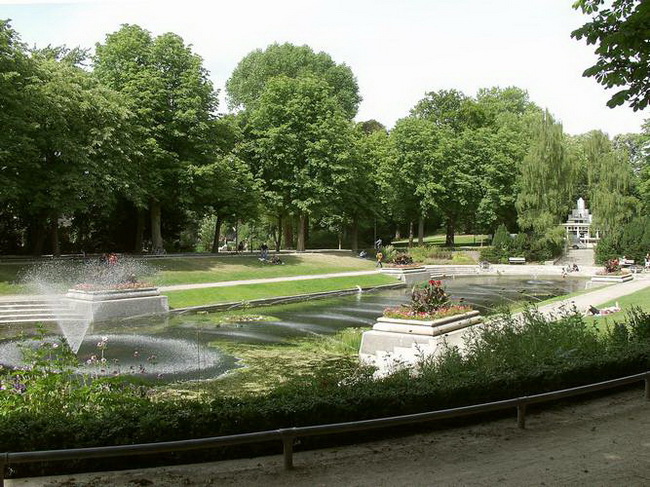 A park is an area of natural, semi-natural, or planted
space set aside for human enjoyment and recreation or for the protection of
wildlife or natural habitats. It may consist of grassy areas, rocks, soil, and
trees, but may also contain buildings and other artifacts such as monuments,
fountains or playground structures. In North America, many parks have fields
for playing sports such as soccer, baseball and football, and paved areas for
games such as basketball. Many parks have trails for walking, biking and other
activities. Some parks are built adjacent to bodies of water or watercourses,
and these parks may comprise a beach or boat dock area. Often, the smallest
parks are in urban areas, where a park may take up only a city block or less.
Urban parks often have benches for sitting and they may contain picnic tables
and barbecue grills. Parks have differing rules regarding whether dogs can be
brought into the park: some parks prohibit dogs; some parks allow them with restrictions
(e.g., use of a leash); and some parks, which may be called "dog parks,"
permit dogs to run off-leash.
A park is an area of natural, semi-natural, or planted
space set aside for human enjoyment and recreation or for the protection of
wildlife or natural habitats. It may consist of grassy areas, rocks, soil, and
trees, but may also contain buildings and other artifacts such as monuments,
fountains or playground structures. In North America, many parks have fields
for playing sports such as soccer, baseball and football, and paved areas for
games such as basketball. Many parks have trails for walking, biking and other
activities. Some parks are built adjacent to bodies of water or watercourses,
and these parks may comprise a beach or boat dock area. Often, the smallest
parks are in urban areas, where a park may take up only a city block or less.
Urban parks often have benches for sitting and they may contain picnic tables
and barbecue grills. Parks have differing rules regarding whether dogs can be
brought into the park: some parks prohibit dogs; some parks allow them with restrictions
(e.g., use of a leash); and some parks, which may be called "dog parks,"
permit dogs to run off-leash.
The largest parks can be vast natural areas of hundreds
of thousands of square kilometers (thousands of square miles), with abundant
wildlife and natural features such as mountains and rivers. In many large
parks, camping in tents is allowed with a permit. Many natural parks are
protected by law, and users may have to follow restrictions (e.g., rules
against open fires or bringing in glass bottles). Large national and
sub-national parks are typically overseen by a park ranger or a park warden.
Large parks may have areas for canoeing and hiking in the warmer months and, in
some northern hemisphere countries, cross-country skiing and snowshoeing in
colder months.
Noorderplantsoen
Noorderplantsoen is an urban public park in the city of
Groningen in the Netherlands, situated slightly north of the city center. Its
name is Dutch for northern public garden.
In 1874 the Vestingswet was passed. This law allowed
cities to expand outside of the city walls and fortifications. Since the
fortifications were no longer in use, they were transformed into a public park.
The earth ramparts were incorporated in the park architecture and the moats
were turned into ponds. The architecture is of an English garden style,
characterized by meandering paths and serpentine ponds, inspired by wild
nature. The shape of the park still reflects the former purpose of the area:
the long but narrow park curves around the old city. The park includes an Art
Nouveau bandstand and a small restaurant.
Until the mid-90s the Noorderplantsoen was split up by a
busy road, but a referendum in 1994 decided - with a narrow majority - to close
this road for motorized traffic.
Events
Every year a number of events take place in the
Noorderplantsoen, of which the Noorderzon Theater Festival is well known. This
cultural event takes place at the end of August and is visited by over 125,000
visitors. Many theater, dance and music groups from The Netherlands and abroad
perform during this 11-day festival.
Another well-known event in the Noorderplantsoen is the
plantsoenloop. This run through the park is held annually in October or early
November and attracts about 500 runners. In 2007 the 50th edition of the
plantsoenloop took place.
The Vondelpark is a public urban park of 47 hectares (120
acres) in Amsterdam, Netherlands. It is part of the borough of Amsterdam-Zuid
and situated west from the Leidseplein and the Museumplein. The park was opened
in 1865 and originally named the "Nieuwe Park", but later renamed to
"Vondelpark", after the 17th-century playwright and poet Joost van
den Vondel. Yearly, the park has around 10 million visitors. In the park is an
open-air theatre, a playground and several horeca* facilities.




No comments:
Post a Comment